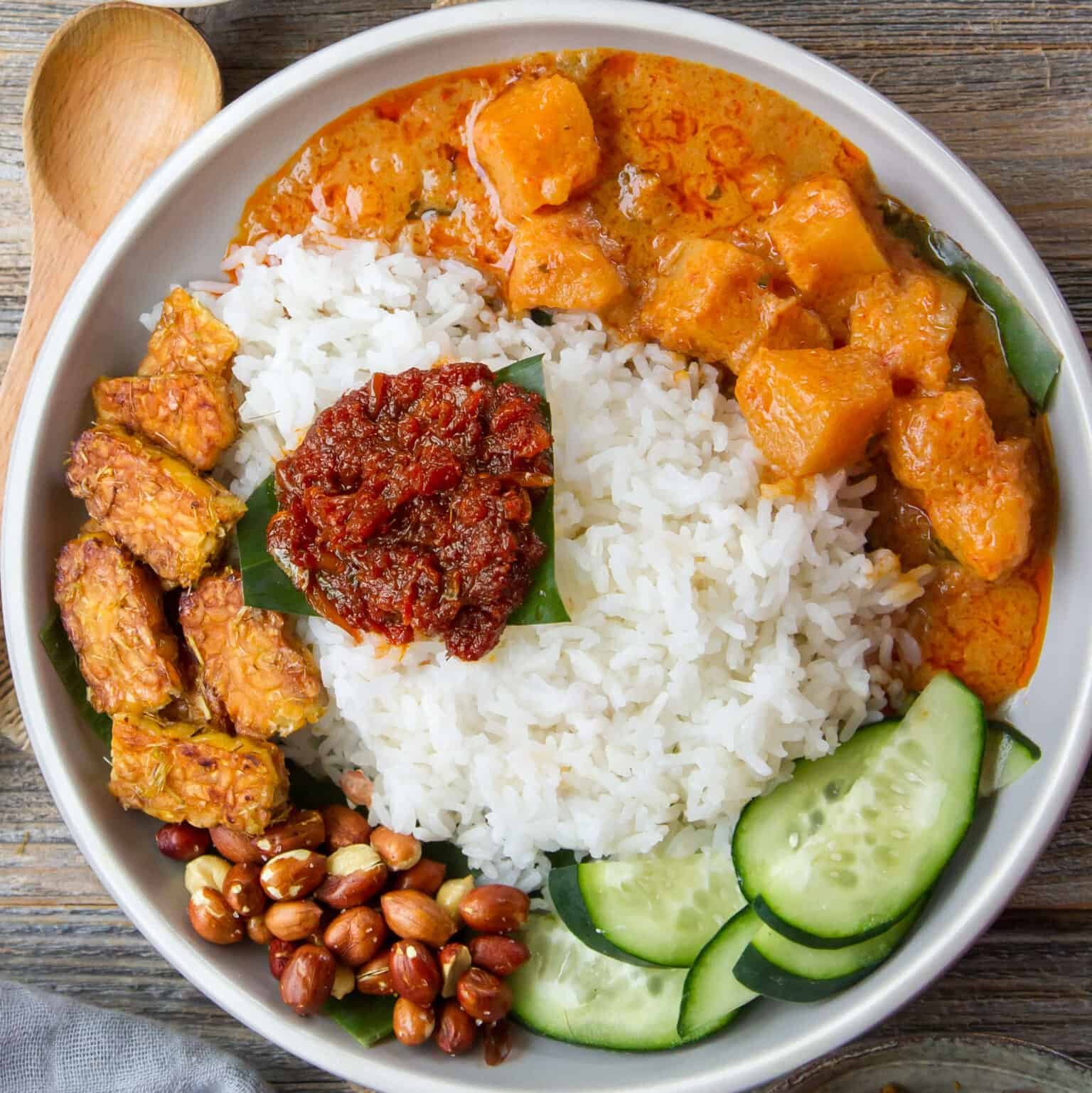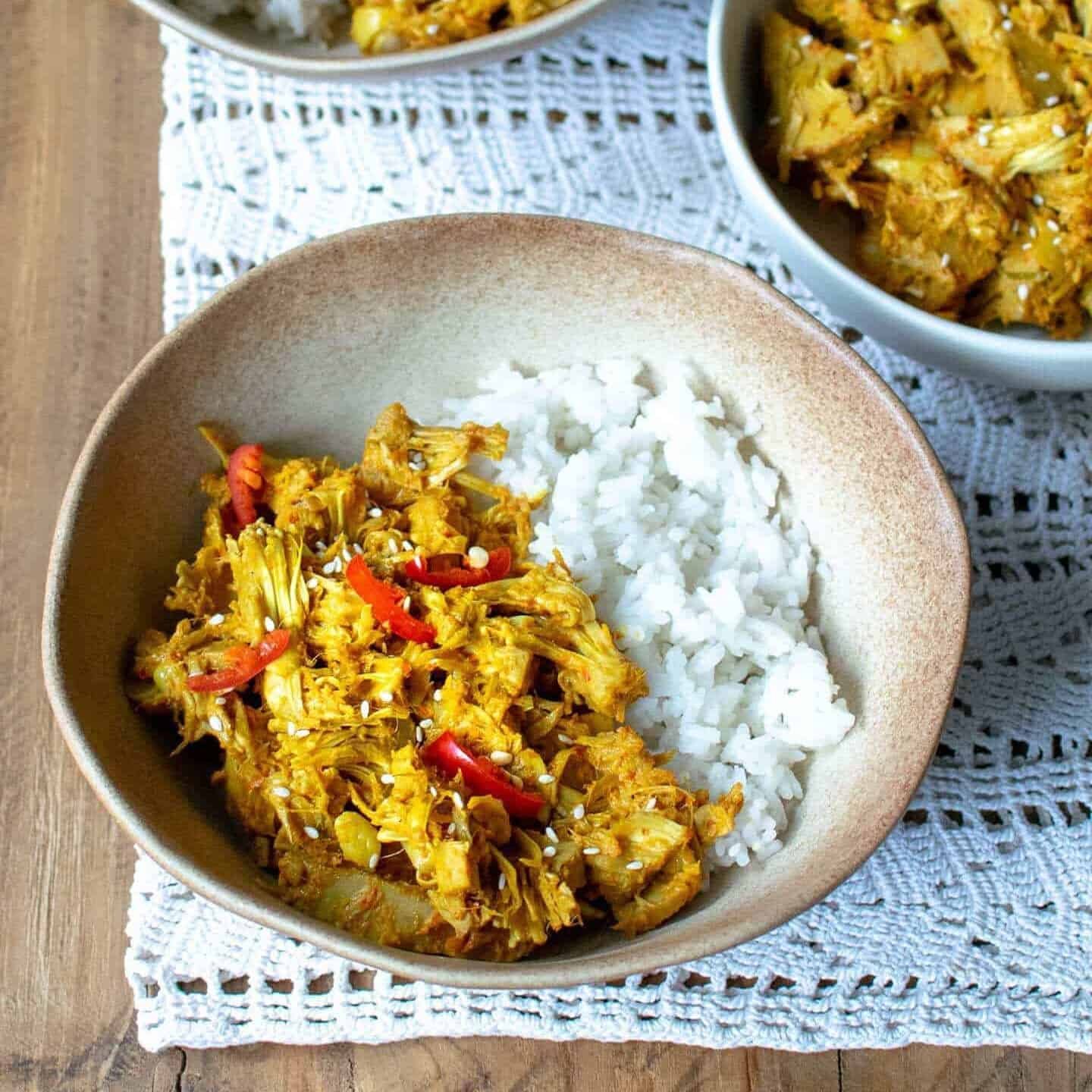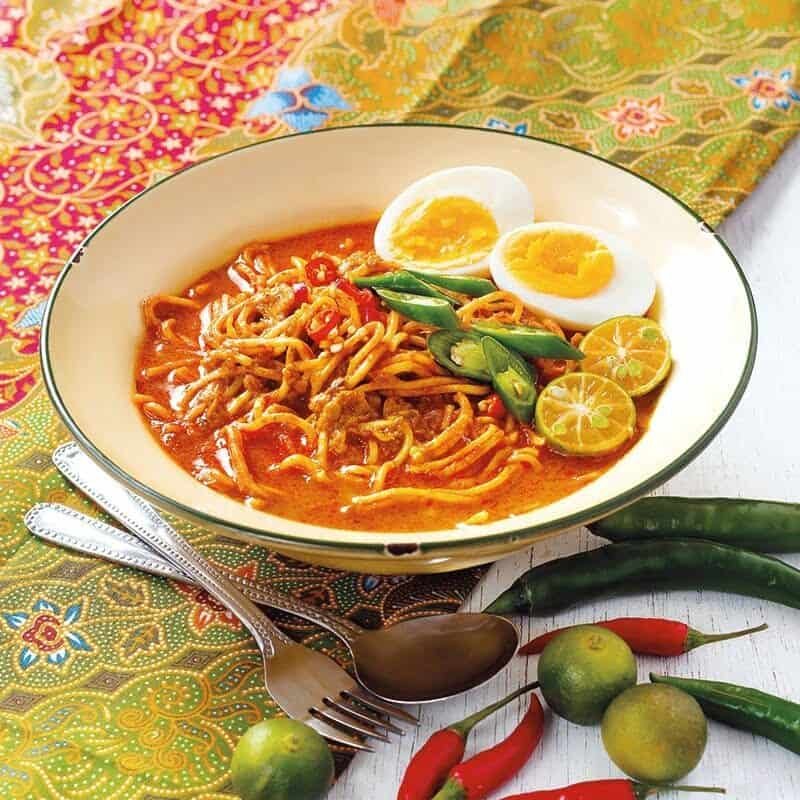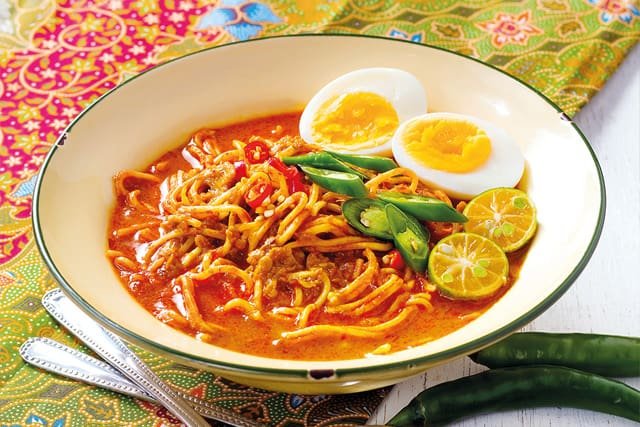When one thinks of Malaysia’s rich and diverse food landscape, common traits include thick, spicy textures and lively aromatics that are all blended within a sea of stocks, pastes and flavourings. Malaysia is known for its use of seafood and meat, and with classic dishes such as beef Rendang, prawn Laksa and crispy Ayam Goreng, it would be hard to imagine Malaysian cuisine as accommodating to vegetarians.
However Malaysian food is derived from cultures where meat does not always play a central role in food. Examples include the Tamil Hindu immigrants from southern India where beef and meat are forbidden. The same applies to many Chinese and Thai Buddhists whose faith prohibits the consumption of meat.
It’s possible to create some of the world’s favourite Malaysian dishes to make them completely free of meat and suitable for vegetarians. In this article, we’ll show you how to make 100% plant-based versions of some of Malaysia’s most succulent dishes that don’t compromise on flavour!
Is Malaysia a vegetarian country?
Over the last few years, vegetarianism in Malaysia has become popular in major cities as global consciousness over the environment and personal health grows. In a review of data from 183 countries worldwide, Malaysia was ranked third most vegetarian-friendly in the global vegetarian index. The list was produced by online travel company Oliver’s Travels whose team of researchers based their findings on factors like the number of vegetarian-friendly restaurants per capita and annual meat consumption per capita.
While the rise in vegetarian restaurants can be partly due to catering to vegetarian tourists visiting Malaysia, a growing number of Malaysians are choosing a meatless diet with many vegetarian-friendly restaurants popping up around major food hot spots like KL, George Town and Kuching. A lot of the flavour from Malaysian cooking involves the use of stocks, juices, pastes and animal fat so some vegetarian dishes may contain traces of meat because of this. Examples of this are the ghee/shortening used in Roti Canai and meat-infused oil used to wok fry Nasi Goreng. Thankfully, it’s easier today to find certified vegetarian options with apps like GoVeggie which have made it easier for Malaysians to find highly rated vegetarian food vendors across Malaysia.
Going vegetarian on Classic Malaysian dishes
While there are many great vegetarian dishes in Malaysia’s food scene, it doesn’t mean that the classic Malaysian dishes can’t be enjoyed by vegetarians. With a few small changes and substitutions, meat-based ingredients can be replaced with plant-based ones while still providing a similar flavourful experience! The great thing about Malaysian food is that it’s heavily aromatic and makes use of herbs and spices above all. This makes it possible to retain the signature lively flavours without using meat.
Vegetarian Nasi Lemak
Nasi lemak is the national dish of Malaysia, consisting of rice cooked in coconut milk and served with sambal, anchovies (ikan bilis) and a fried egg. At first glance the recipe doesn’t seem to be meat heavy but to make this truly vegetarian friendly, we need to make some adjustment to the sambal which contains shrimp paste, and replace the ikan bilis with a plant-based alternative.

Vegetarian Ikan Bilis
Ikan bilis (dried anchovies) gives Nasi Lemak a salty umami flavor that works great with the sweetness from the coconut milk rice. It’s possible to recreate this flavor using dried king oyster mushroom strips which contain seafood-like notes and a nutty earthy taste.
1. Simply cut a single oyster mushroom width ways into disks and then slice these discs into strips.
2. Coat these mushroom strips with sesame oil and lightly salt them.
3. Wok fry strips for 2-3 minutes until crispy.
4. Lay mushroom strips out on a baking tray and mist them with vinegar before letting them dry out in the oven at 140°F for 6 hours.
Vegetarian Sambal
Sambal is a chili based condiment that provides the trademark hot tanginess to Nasi Lemak. The use of fresh light ingredients like lemongrass and galangal alongside chili gives Sambal a spicy punch to counter the sweetness of the coconut milk rice. Pescatarians can try our Dapur Kitchen Sambal paste which contains shrimp. Vegetarians though can substitute the shrimp paste with miso paste which provides a very similar umami. Make sure to use brown miso and not red as this is too strong and will overwhelm the lighter ingredients such as garlic.
1. Soak your chilis in hot water for 20 minutes so that they soften.
2. Grind chillies along with shallots, candle nuts and garlic into a paste.
3. Heat a pan with a hot oil and lightly fry two Pandan leaves for aroma.
4. Remove Pandan leaves and stir the chili, onion and garlic paste into the pan to fry .
5. Add brown miso paste and stir this into the mix until the salty taste is achieved to your liking.
Jackfruit Rendang
Perhaps one of the most globally loved dishes, Rendang is a curry containing braised beef which is cooked down in a rich and spicy coconut sauce until thick. When served with a Roti Canai and/or white rice, Rendang is the ultimate signature Malaysian dish.
One of the great things about Rendang curry is how the slow cooking process tenderises the meat and releases its flavors into the already rich curry sauce. However, we can re-create this very texture by using jackfruit therefore making Rendang curry accessible for vegetarians. Jackfruit is often used in many vegetarian or vegan alternative dishes because it flakes apart when braised in a similar way to meat. It also absorbs flavor very well of which there is plenty of in a Rendang curry.

1. Use either fresh or tinned jackfruit and cut into individual chucks of roughly 2cm.
2. You can either make the Rendang curry paste yourself or buy Dapur Kitchen’s pre-packaged vegetarian rendang paste mix.
3. Start frying your Rendang paste in a few tablespoons of oil until the mix is bubbling and the oil from it has separated to the top.
4. Stir in your jackfruit pieces making sure that they are covered with the mixture. This will help them absorb the aromatics of the paste.
5. After about 5 minutes, add in your coconut milk and continue to sir until the curry lightens.
6. Simmer this for about 2 hours on a low heat making sure to add in small doses of extra water every so often.
7. Use a fork to check the jackfruit, it should break apart easily.
Vegetarian Mee Rebus
Mee Rebus is a dish of egg noodles served in sweet potato curry gravy with a squeeze of lime juice. It’s a warming dish that combines sweet and savory with the delightfully springy texture of yellow egg noodles. Meat isn’t necessarily a huge part of the dish but traditionally, mutton or beef stock is often used along with shrimp paste to form a starting broth. Again pescatarians can try our Dapur Kitchen Mee Reebus containing shrimp. However these ingredients can be switched out for plant based replacements.

1. Create a vegetable broth by adding vegetable stock cubes to boiling water and simmer.
2. At the same time, steam cubes of sweet potato until soft to the touch before mashing them.
3. Create the curry paste by blending dried chillies with lemongrass, galangal, turmeric, onion, garlic and a spoon each of tachou and white miso.
3. Fry this paste in a pan with vegetable oil and gradually add your vegetable broth to the mix.
4. Add 2 tablespoons of soy sauce to the mix and continue to heat.
5. Thicken the mixture by adding the mashed sweet potatoes.
6. Blanch a portion of yellow egg noodles until soft and serve on a plate.
7. Pour Mee Rebus gravy over the top of noodles and garnish with lightly crisp tofu slices or tofu puffs.
8. Serve with a slice of lime, blanched bean sprouts and chilis.
PA Food is Officially Vegan Certified
At PA food we are committed to sharing our culinary culture with the world in an inclusive and environmentally conscious way. As such, we’re proud to announce that selected PA Food products meet the criteria for “the production of vegan products” as specified by the Vegetarian Society of the United Kingdom.
Share :








